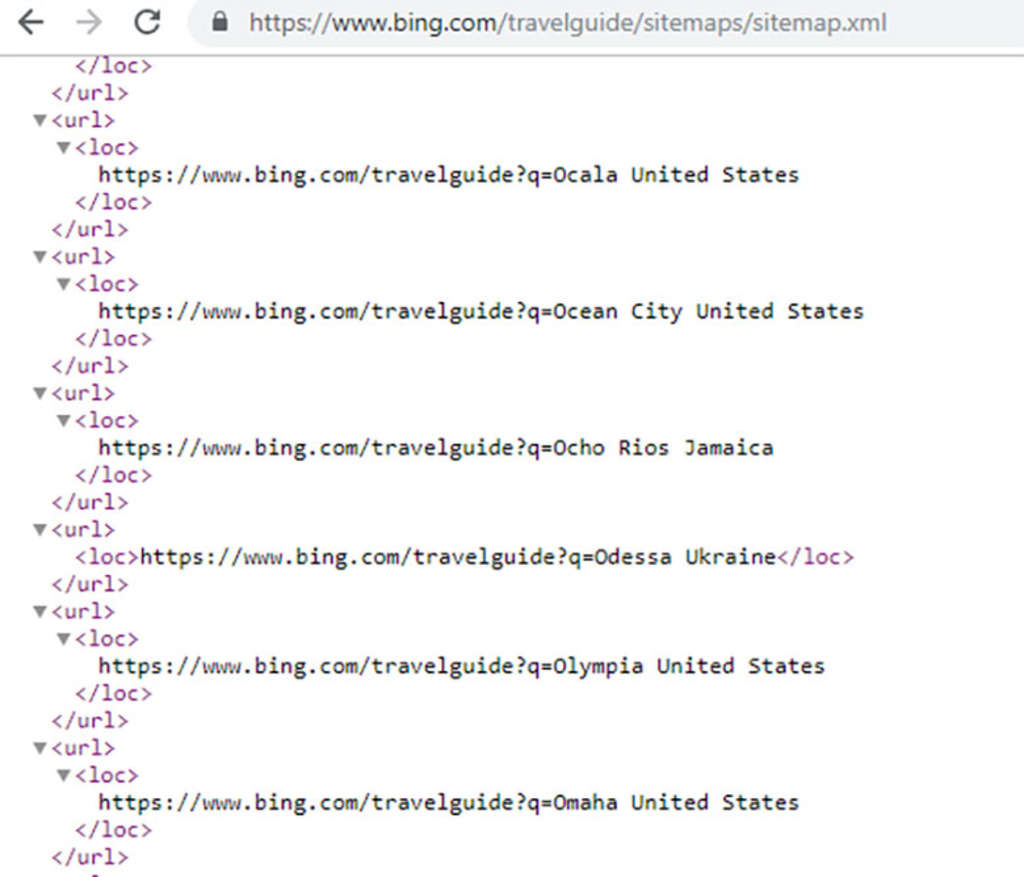Is Bing about to launch it's own Travel Guide to Compete with Google?
Having a poke around Bing's XML sitemap (a file which helps search engines to pick up and index content on a website) there are a few interesting references listed, one of which being the "travel guide" sitemap which is accessible at the link below: https://www.bing.com/travelguide/sitemaps/sitemap.xml.
Viewing the sitemap shows a list of search queries apparently listing a variety of cities/counties along with their respective countries. This mainly features the United States, but also spans most of the globe as you can see below.
Opening any of those URL's currently shows an error page, which to most SEO specialists would be a bit of a red warning flag. Including them in the XML sitemap in this way is done to help search engines (like Google) find these pages, but if those pages don't exist and return what's called a 404 error status, it defeats the point of including them here in the first place.
Checking on the Way Back Machine it seems the travel guide URL was crawled and indexed in May 2018, but the cached page also shows a 404 page. So that begs the question - why were they added to the XML sitemap, and where is the travel guide (or what happened to it)?
Could the sitemap have been updated a bit too eagerly, with Bing planning a new travel guide series? Or could this have been a failed or aborted project - the likes of which happens all the time with Google and Bing, more affectionately termed as project "sunsetting".
The Google Travel Guide - First-mover Advantage?
Google on the other hand released their travel guide series a few months back, and have slowly but surely been pushing deeper into the travel sector - first with Google Flights, and now with Google Hotels. Searching for most major cities shows the Google Travel Guide as the first result, linking out to the Destination URL - such as https://www.google.com/destination?q=new+york+travel+guide.
This auto-generated page contains information on things to do nearby, places to visit (with suggested day itineraries), hotels to stay at, best times to visit, plus other related articles from the web.
It's clear that many travel companies will be aiming to optimise for these destination guide pages, as they'll be driving huge amounts of traffic almost directly from the search results. This is something Tim Capper wrote about a few months ago over on the SEM Rush blog. As a side note - I was lucky enough to interview Tim back in August where we discussed this, and other elements of search marketing for hotels and travel, in some more detail.
It's unclear whether Google will be allowing these Travel Guides to get indexed in the traditional search results (none of these pages are currently indexed and it looks as if they're blocking this from happening, although there's no "noindex" tag used on these pages just yet) but I'd guess they'd really be pushing their luck if they did ever allow indexing- and risking further punishment from the EU.
Is Bing launching it's own Travel Guide series?
It's hard to say for sure but it does look like Bing might have something planned. Very recently they made clear strides in optimising on Google through their new Collections feature, as highlighted in the below Tweet by SEO expert Dan Shure.
And to put it nicely, Bing does have a history of imitating their massive rival, looking to see the impact of Google's updates and following suit when appropriate. And who would blame them should they decide to launch their own travel guide - one which makes use of their current partnerships with OpenStreetMaps, TripAdvisor, KAYAK, and various others.
Could the travel guide be Bing's next attempt at getting more ingrained as a new layer in the lucrative travel search market, or perhaps am I just reading too much into their XML sitemaps? If history is anything to go by its highly likely that Bing will indeed follow Google's lead, much in the way they've done to date.
Matt Tutt
Digital Marketing Consultant at Matt Tutt Digital Marketing
Matt Tutt Digital Marketing









